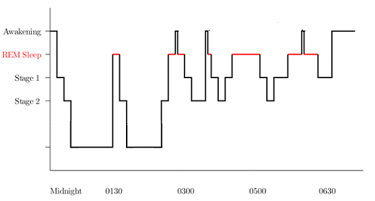
What is sleep?
All sleep is not the same. We have two very different types of sleep - Non Rapid Eye Movement sleep (NREM sleep) and Rapid Eye Movement sleep (REM sleep). Both these types of sleep serve very different purposes but sufficient amounts of both are essential to our health and well-being.
NREM sleep
This type of sleep is divided into 3 stages - Stages 1 and 2 (also known as light sleep) and Stage 3 often referred to as Slow Wave Sleep (SWS) or deep sleep. The various sleep stages are defined by the specific type of brain wave activity present.
Stage 1 NREM sleep: This marks the onset of sleep. In this stage a person is very easily aroused by, for example, calling the person's name or closing a door etc. This is a transitional stage and at sleep onset lasts for about 1 - 7 minutes.
Stage 2 NREM sleep: In this stage a more intense stimulus is required to arouse a person. Depending on tiredness this stage initially lasts for approximately 10 - 25 minutes.
Stage 3 NREM sleep: This stage of sleep is also known as deep sleep or slow wave sleep (SWS) due to the characteristic slow brain waves. This is the deepest stage of sleep and the stage from which it is most difficult to arouse - if awoken from this stage of sleep it is very likely that the person will be highly disorientated. This stage of sleep generally lasts about 20 – 40 minutes during the first sleep cycle of the night and after a brief ascent into light sleep, normally indicated by a series of body movements, the sleeper will then go into REM sleep.
REM sleep
This sleep state is characterised by the presence of actual rapid eye movements (hence the name REM sleep) and a brain-wave pattern that is very similar to the awake brain. It is the stage of sleep in which dreaming occurs and throughout REM sleep periods most of the healthy adult's muscles are paralysed (except the eye muscles and some of the muscles that are associated with breathing). An easy way of thinking about REM sleep is an activated brain in a paralysed body. In the healthy person the first REM period of the night is usually very short and may only last for about 5 - 10 minutes.
Normal sleep
Throughout the night there is a progression through each of the stages of sleep (see diagam). The sleep cycle (from stage 1 NREM sleep to REM sleep and back again) is repeated every 90-110 minute throughout the sleep period. Deep sleep or SWS dominates in the first third of the night and accounts for about 20% of total sleep time although the amount of deep sleep we get decreases with age. REM sleep dominates in the final third of the night and accounts for about 20 - 25% of total sleep time. It is perfectly normal to be awake for about 5% of total sleep time.


